

Definition Of Digital Citzenship. The Definition Of Digital Citizenship by Terry Heick As more and more students interact digitally–with content, one another, and various communities–the concept of digital citizenship becomes increasingly important.
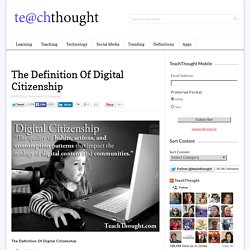
The Inside-Out School: A 21st Century Learning Model. The Inside-Out School: A 21st Century Learning Model by Terry Heick As a follow-up to our 9 Characteristics of 21st Century Learning we developed in 2009, we have developed an updated framework, The Inside-Out Learning Model.
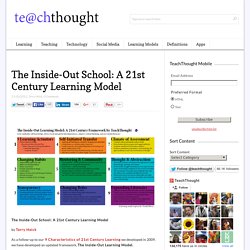
The goal of the model is simple enough–not pure academic proficiency, but instead authentic self-knowledge, diverse local and global interdependence, adaptive critical thinking, and adaptive media literacy. By design this model emphasizes the role of play, diverse digital and physical media, and a designed interdependence between communities and schools. The attempted personalization of learning occurs through new actuators and new notions of local and global citizenship. 9 Characteristics Of 21st Century Learning. The label of “21st Century learning” is vague, and is an idea that we here at TeachThought like to take a swing at as often as possible, including: –weighing the magic of technology with its incredible cost and complexity –underscoring the potential for well thought-out instructional design –considering the considerable potential of social media platforms against its apparent divergence from academic learning Some educators seek out the ideal of a 21st century learning environment constantly, while others prefer that we lose the phrase altogether, insisting that learning hasn’t changed, and good learning looks the same whether it’s the 12th or 21st century.
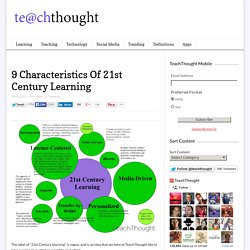
At TeachThought, we tend towards the tech-infused model, but do spend time exploring the limits and challenges of technology, the impact of rapid technology change, and carefully considering important questions before diving in head-first. The size of the circles on the map are intended to convey priority. 1. 2. 3. 4. 5. 6. 7. 8. 9. How 21st Century Thinking Is Just Different. How 21st Century Thinking Is Just Different by Terry Heick This content is proudly sponsored by The Institute for the Habits of Mind, promoting the development of personal thinking habits in 21st century learners.

In an era dominated by constant information and the desire to be social, should the tone of thinking for students be different? After all, this is the world of Google. In this world full of information abundance, our minds are constantly challenged to react to data, and often in a way that doesn’t just observe, but interprets.
Digital literacy. Peeragogy. Apprendre 2.0. Curation. Web 2.0. Enjeux web. New Media Literacies — Learning in a Participatory Culture. The Urge to Create: Jane Piirto on Motivation. Eric Clapton “My identity shifted when I got into recovery.”
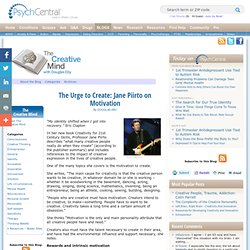
Eric Clapton In her new book Creativity for 21st Century Skills, Professor Jane Piirto describes “what many creative people really do when they create” (according to the publisher summary) and includes references to the impact of creative expression in the lives of creative people. One of the many topics she covers is the motivation to create. She writes, “The main cause for creativity is that the creative person wants to be creative, in whatever domain he or she is working – whether it be woodworking in the basement, dancing, acting, drawing, singing, doing science, mathematics, inventing, being an entrepreneur, being an athlete, cooking, sewing, building, designing.
“People who are creative must have motivation. She thinks “Motivation is the only and main personality attribute that all creative people have and need.” Rewards and intrinsic motivation “What are the rewards for being creative? How are you motivated? The 21st Century Skills Teachers Should Have. Technology advancements have touched every facet of life including education.
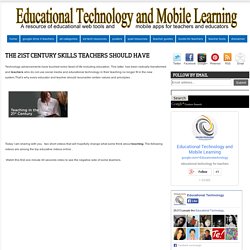
This latter has been radically transformed and teachers who do not use social media and educational technology in their teaching no longer fit in the new system.That’s why every educator and teacher should reconsider certain values and principles . Today I am sharing with you two short videos that will hopefully change what some think about teaching. The following videos are among the top educative videos online . Watch this first one minute 40 seconds video to see the negative side of some teachers. Negative version of when i become a teacher So if you want to fit in the system and develop professionally then this is how to do it . watch this short video to learn more.
Changing Education Paradigms - 1 Translation. Slideshare. Skoodio NewSchools Venture Pitch 2011. HP Catalyst Initiative. Collective intelligence 2.0. The 21st-century classroom can be a daunting place. Personal Learning The Web 2.0 Way. Péd 2.0. 21st century learning. Superhero School: An Epicenter for Disruptive Innovation. The rhizomatic learning lens & what rhizomes are good for. Théorisation d’une pédagogie alternative de la technologie. Par Patrick Plante, doctorant en technologie éducative à l’Université Laval Théorisation d’une pédagogie alternative de la technologie Problématique et objectifs À la base de notre problématique, il y a le désir de réfléchir à la place que nous devons donner à la technologie en éducation dans la visée des grandes finalités éducatives, et notamment celle qui cherche à former des citoyens qui participent activement à la protection et à l’amélioration de la société.
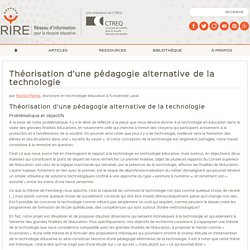
On pourrait ainsi croire que plus il y a de technologie, meilleure sera la formation des élèves et des étudiants dans une « société du savoir ». Si cette conception de la technologie est largement partagée, notre travail consistera à la remettre en question. C’est ce que nous avons fait en interrogeant le rapport à la technologie en technologie éducative, mais surtout, en objectivant deux malaises qui constituent le point de départ de notre recherche.
Une théorie politique de la technologie Une pédagogie hacker? Conclusion. Sugata Mitra.